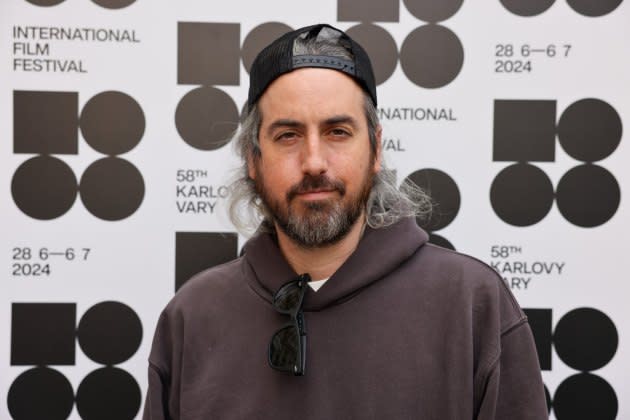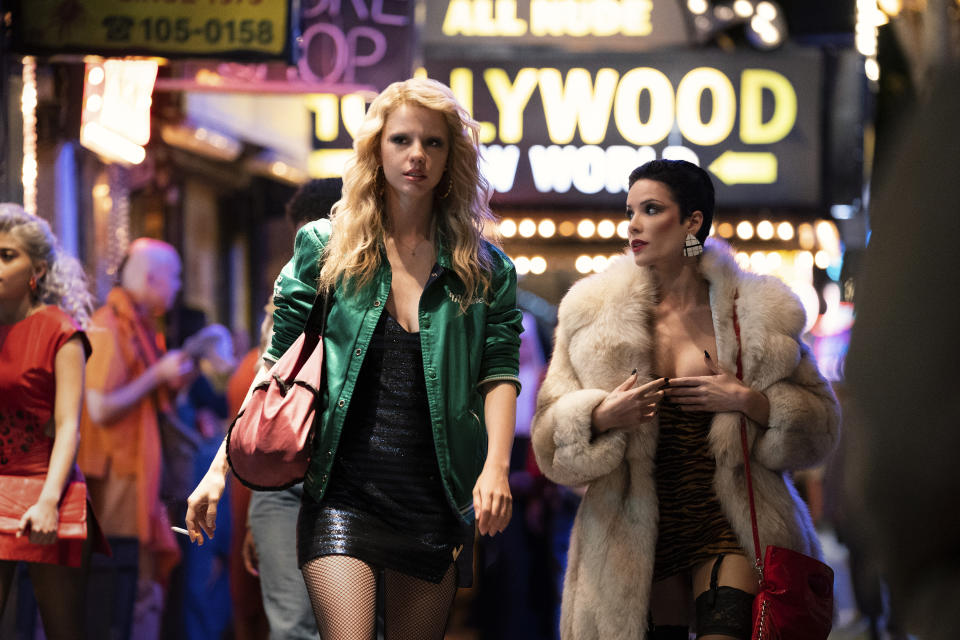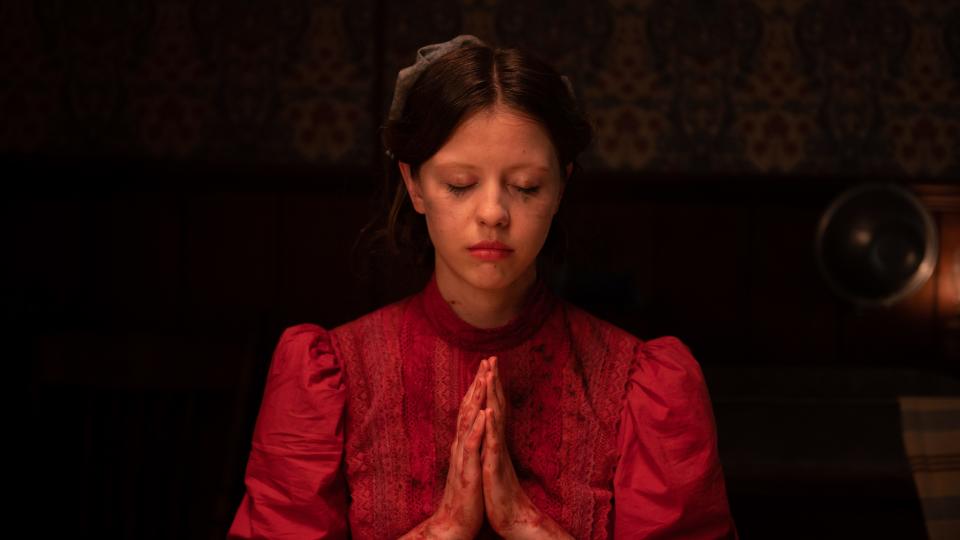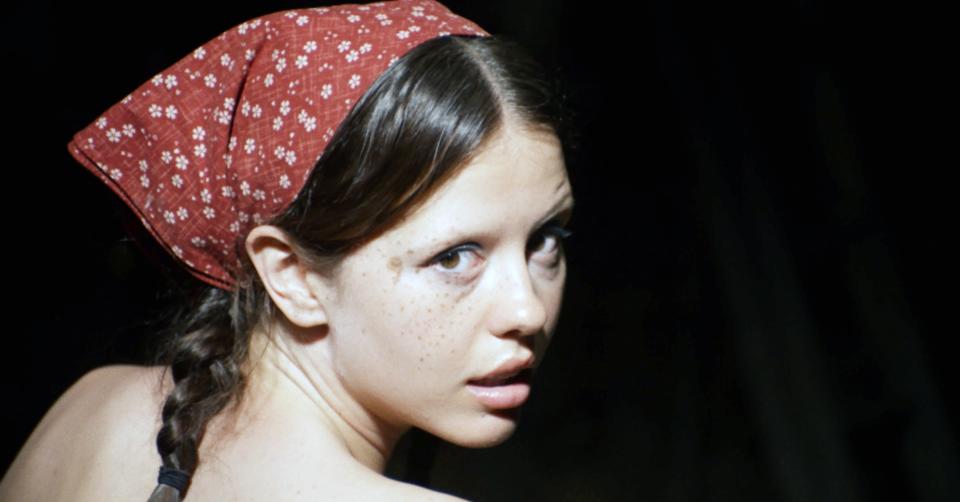Ti West Interview: The ‘MaXXXine’ Director Ends The ‘X’ Trilogy With A Look At The Seedy Side Of Hollywood In The Excessive ’80s – Karlovy Vary

Christmas has come early for genre fans this year with the release of MaXXXine, the third and perhaps not-so-final part of a horror trilogy that began in 2022 with X, a splatterfest set in the ’70s porn industry. Mia Goth was director Ti West’s leading lady, playing both Maxine Mink, the leading lady of the skinflick being made (The Farmer’s Daughters), and her crazy old nemesis, Pearl, who most violently objects to the goings on at her and her husband’s respectable Texas farmstead. For the second film, Pearl — a near-instant prequel — Goth resumed the title role, but in the latest, and for now the last, she reverts to Maxine Mink.
In the neon-lit, Hi-NRG world of MaXXXine, Maxine, it transpires, has escaped the notorious “Texas Porn-Shoot Massacre” without a scratch to her rep, and is about to embark on a legitimate acting career in a mid-range Hollywood horror film, The Puritan II, being shot by British diva-director Elizabeth Bender (Elizabeth Debicki). Maxine’s past catches up with her, however, when a sleazy private eye (Kevin Bacon) gets on her tail, threatening to reveal all. She has bigger fish to fry, though, since a satanic, leather-gloved serial killer — possibly the notorious Richard Ramirez, AKA The Night Stalker — is on the loose, and her friends in the sex-work business are firmly within his (or her) sights.
More from Deadline
Though the film has fun with ’80s tropes — big hair, neon lighting, electro-pop hits (like Animotion’s “Obsession”) and the “Satanic Panic” that saw the likes of Judas Priest accused of hiding secret messages in their music — MaXXXine doggedly continues the throughline of West’s films in its investigation and subversion of movie tropes, notably a scene that sees Maxine chased by Bacon’s PI into the fake interior of the Psycho house on the Universal lot.
You might conclude then, after all the bloodshed has drained into the gutter, that the real villain here is Hollywood itself, and a quote from Bette Davis — “In this business, until you’re known as a monster, you’re not a star” — seems to cement that. West, however, refused to confirm or deny when he spoke to Deadline before MaXXXine’s unveiling at the Karlovy Vary International Film Festival.
DEADLINE: Was it always your intention for this film series to be a trilogy? At what point did you realize that there was going to be a third part to it?
TI WEST: It was always supposed to just be one movie called X. I wrote a movie called X that I sent to A24. They said they would make it, and then Covid happened, and we went to New Zealand to make it. We were the only people in the world — well, some of the only people in the world — making a movie at the time. I thought, To go to New Zealand, to get work visas, to be fortunate enough to be some of the only people on planet Earth to make a movie, and then tear everything down just to go home and sit in our houses seems like a terrible waste of an opportunity. So, I was like, “Why don’t we stay in New Zealand and make two movies?”
But [after X] there weren’t very many characters left alive, so there wasn’t much of a story. It occurred to me that could go back in time and make a prequel, because we’d built the location, and we had the actor. So, if we had a script, the second movie would cost less, and we’d already be up and running. So, in the two-week quarantine period that it took to get into the country, I collaborated with Mia and then I pitched that idea to A24. I said, “Look, we can make this movie for less money than the first movie, and we can make them both back to the back. No one else in the world’s making movies — and you could have two.” Then I was like, “We could make a third movie about Maxine when she goes to…” Well, whatever happens to her after X. She could go to Hollywood.
I jokingly called the movies X, XX, and XXX, after the American ratings system. But we didn’t end up calling the sequel XX, we called it Pearl. And for the third, I had the idea for MaXXXine around the same time as I had the idea for Pearl, but we had to wait and see if people liked the other two movies before A24 would greenlight the third one. It turned out that people did like them. So, then I wrote MaXXXine while we were in post-production on Pearl, and now here we are in the Czech Republic chatting about it.
DEADLINE: You must have had some ideas percolating. How did you whittle down what you wanted to say in the third iteration?
WEST: Well, the first two movies were very contained, so one thing I wanted to do in the third movie is give it a lot more scope. Because, at least for me, the thing about making this trilogy was that I wanted to make each one a standalone movie. They’re enriched by each other, and it’s better if you see them all, but you don’t have to see them all. By making them standalone movies, I didn’t want to just repeat the same beats over and over again.
I always thought of X as one era, and the characters in that era are being affected by the cinema of the era. Pearl was a different era, and the characters were also affected by the cinema of the era. So, the natural progression was to then go to the ‘80s and to have Maxine evolve as a character and be affected by the cinema of that era. And that era was a more excessive era, which offered a different way into the story. The mid-’80s, for me, was the seedier side of Hollywood, which allowed for more giallo-type aesthetics, and noir-type aesthetics, things like that. That, for me, made me excited to try to find a different way into the same thematics.

DEADLINE: You’re obviously too young to remember the ’80s in such forensic detail. What informed your knowledge of the real-life things that you put into the movie?
WEST: Well, I’d say my teenage years were certainly in the ’90s. But as for the later 80s… I’m an only child, and I grew up in the video store consuming as much TV and everything as possible, so I’ve always had a fondness for it. I think some of my formative years came a little earlier than normal. I’ve always been fascinated by that era, but I don’t know if, when I was a kid, I knew about The Night Stalker, because I’m from the East Coast — I would’ve been too young, and it wouldn’t have meant much to me. But I remember all my babysitters were into heavy metal music and stuff. I remember there being a moral outcry about what their hair looked like and what their clothes looked like.
DEADLINE: And the so-called “Satanic Panic”?
WEST: My parents worried about that. They’d say, “You could be kidnapped and taken by a satanic cult!” I was only seven or eight years old! But things like that that permeate you. But by setting the film in the summer of 1985 in Los Angeles, the backdrop of a serial killer creates a lot of stakes and adds a lot of more of an uneasy vibe than, say, the year before, when LA was hosting the Olympics. And also, 1985 was the height of the PMRC — the “moral majority” — and censorship of the movies, with the “video nasties” scare in the UK. Things like that were thematically related to these three movies about cinema.
By the way, people forget that this controversy made it very high up into politics and government, with people saying that there were hidden messages in rock music. Artists had to go on trial and say, “There are no Satanic messages in our music, they’re just songs.” Horror movies were just seen as one step above that. It was a very limiting time.
DEADLINE: What were you thinking in terms of the character of Maxine, and how far she would get in the so-called straight world of acting?
WEST: Well, for Maxine, her main goal is to be a star, and she’ll do whatever that takes… Her goal is to be the person that she wants to be, and that’s this elusive, far-off thing that requires insane ambition — and insane, fortunate opportunity — to give her the life that she wants. I think she’s hit the ceiling, as far as adult movies go. The next thing is to transition into “straight” cinema. A couple of people have done it — Marilyn Chambers, Traci Lords — but to make it all the way is very rare and difficult. So, the stigma of being in adult movies is something she has to carry into the straight pictures.

DEADLINE: How much does Mia put into this character? How much is it based on her experiences, and how much is it just a character that you both wrote together?
WEST: I don’t know. You’d have to ask her about her experiences. But I think, as far as what she brings to it, she brings a tremendous amount. At this point, she knows the character very well. She knows the kinds of choices the character’s made. I’m just creating scaffolding with the script, in terms of where the plot’s going and some of the things that she’s saying, things like that. But once we’re on set, I don’t really have to tell her much about who the character is. She knows that as much, if not more, than I do. I’m just trying to wrangle her into the movie that I’m making. She’s a very fearless and unpredictable actor, so I’m trying to give her boundaries and then say, “Within these boundaries, let’s see what happens.”
DEADLINE: Was the Bette Davis quote something that you had in mind all along? It does seem that women are held to a very different standard in Hollywood, and certainly in showbusiness in general. I wonder how that quote came to you, and why you applied it.
WEST: Well, I think that being a star is such a hard thing to articulate or define. Certainly, in Hollywood, in showbusiness, there’s this really bizarre, artifice thing that’s very hard to also nail down. There’s some ambiguity in that quote, but also there’s a very pronounced [meaning to it]… Bette Davis had a reputation, and there was just something about that quote that felt like it set up the kind of story, and the kind of world, that we were about to go into. I don’t want to over-talk about it, just because I don’t want to put any ideas into people’s heads about it. I don’t know what Bette Davis meant, but I do have a sense of what she meant. I just think the quote itself has an impact. It speaks to the strangeness of being a star. If you want to get more literal about it, there’s the sense of the kind of person you have to be, the kind of toughness you have to have, to be a star.
DEADLINE: Am I right in thinking you got the run of the Universal lot for this movie?
WEST: Yes, that’s true.
DEADLINE: So, what did you take from that? Obviously, you had the whole studio to play with. What did you choose to run with, and what were you looking for in that location?
WEST: Well, I always had in my head the idea of using a studio backlot as a backlot, having the fake town be the fake town. I always liked the idea of going from New York into the Old West and exposing that facade. It’s an idea I’ve had for a very long time, and this movie then appeared as a vessel for that. In X, they have a conversation about Psycho. For MaXXXine, I wrote [the scenes at the Psycho house] into the script, not sure if we’d ever get the permission to do it, but it was interesting for us to actually get to go and do it. It was very surreal, to be honest. It was fun being on the lot, but to actually photograph the Psycho house was a weird thing to do.

DEADLINE: Is this the end of Maxine Mink, or will she return? Do you think there’s more scope for her adventures?
WEST: I don’t know. There’s always a chance. But for almost five years I’ve been doing this pretty much non-stop. Like, all day, every day, because I write, direct, edit, produce — everything. So, I’m very happy with the three movies. I’m very proud of our collaboration on the three movies, and I do have some ideas about how to continue the universe that is X. But after working on it non-stop for so long… In about two weeks, it will be the first time I actually wake up in the morning and not find myself behind something related to the X franchise. So… I don’t know, we’ll see. I might want to take a beat and maybe go do something else, and then maybe one day come back to it.
DEADLINE: Were you at all trying to mess around with form on this movie? MaXXXine takes the form of a slasher movie, but it’s not really a slasher movie. You allude to those kinds of movies, but it isn’t one of those movies, if you get my drift. I thought you were making some very interesting choices within a genre that people consider to be obvious, and you took it in a different way.
WEST: Yeah. Part of that is just that what I didn’t want to do is repeat myself from the other movies. I wanted to try to do something that felt like it hadn’t been seen before. Now, there are plenty of things in MaXXXine that are evocative of things we’ve seen before, but the story itself, and the way it plays out, felt like a fresh take on that to me. To me, the exciting thing about the trilogy is that all three movies are different, and people can argue about which ones they like. Hopefully they’ll like them all, but if they don’t, well, maybe they’ll like at least one of them — and that’s a win.
If they have a passionate reason to X the most, great. If they have a passionate reason to like Pearl the most, great. If they love MaXXXine, I’m happy. If it’s all three, even better. But I think what’s fun about it is, there’s a little bit of something for everybody in there, and you don’t have that kind of sequel fatigue that usually sets in. I think you can wear out your welcome pretty easily.
So, for me, the theme of her ambition, the theme of her wanting to be a star and change her life, and the theme of cinema running throughout — to me — is the most exciting element [of the trilogy]. If one of these movies is on TV, hopefully you’ll see it while you’re flipping channels, you’ll stop and you’ll leave it on.
DEADLINE: Do you have anything else in the tank after this, or are you just going to take the time off and come up with your next project?
WEST: I do have a plan, but… You never know. We’ll see. If all things work out, then, yes, I have a plan for another movie. But things rarely ever work out. So chances are this will not be my last movie, but how soon the next one will be, I don’t know. It depends on how it goes. I’m hoping it will be sooner rather than later, but we’ll see.
DEADLINE: You’re going to stick with genre for the time being, I guess?
WEST: Yeah. If it’s the one I’m thinking of, it’s very different from these movies. [Laughs.] But it’s not a romcom.
Best of Deadline
The Movies That Have Made More Than $1 Billion At The Box Office: Photo Gallery
Hollywood & Media Deaths In 2024: Photo Gallery & Obituaries
Sign up for Deadline's Newsletter. For the latest news, follow us on Facebook, Twitter, and Instagram.


